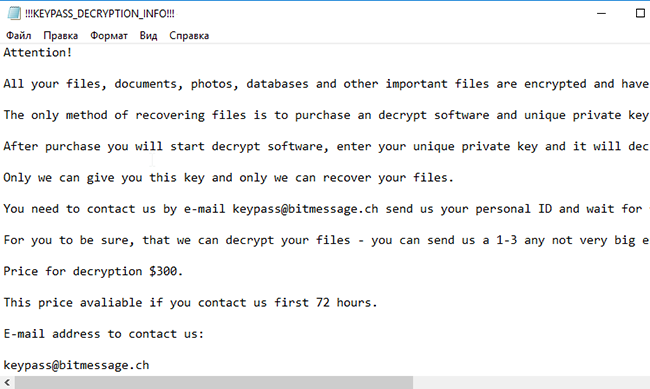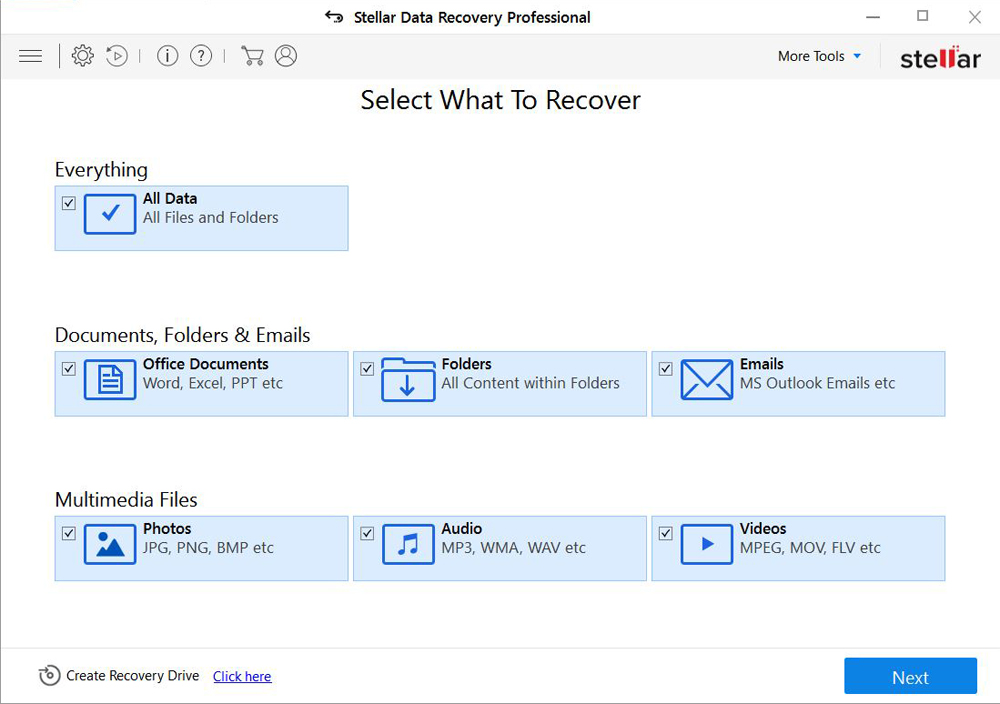What is Keypass Ransomware?
Keypass Ransomware is a “virus-encoder”, that has been discovered at the beginning of August 2018. This virus operates quite the same way as any other ransomware: it encrypts sensitive files on the victim’s computer adding some file extension, in this particular case is .KEYPASS. As a result, the user unable to use them until they are decrypted. In order to get control over these files, a victim have to pay $300 to malefactors. We urgently advise you not to contact them and especially to make any concessions. Remember, you are dealing with fraudsters who don’t care about your files and whose the main purpose is to make a profit. Hence, there is a high risk of being left without decryptor and money. Instead, you may try using this guide to remove Keypass Ransomware and decrypt .KEYPASS files without spending any money.

The principle of work of the ransomware is always the same – to encrypt files and then to require payment. Keypass Ransomware encodes users’ personal files via AES encryption algorithm. All infected files will be appended with .KEYPASS. For example, file “myfamily.jpg” will turn into “myfamily.jpg.KEYPASS”. Upon the completion, it leaves !!!KEYPASS_DECRYPTION_INFO!!!.txt file at the desktop that contains instructions from criminals to decrypt encrypted files:
Attention!
All your files, documents, photos, databases and other important files are encrypted and have the extension: .KEYPASS
The only method of recovering files is to purchase an decrypt software and unique private key.
After purchase you will start decrypt software, enter your unique private key and it will decrypt all your data.
Only we can give you this key and only we can recover your files.
You need to contact us by e-mail keypass@bitmessage.ch send us your personal ID and wait for further instructions.
For you to be sure, that we can decrypt your files – you can send us a 1-3 any not very big encrypted files and we will send you back it in a original form FREE.
Price for decryption $300.
This price avaliable if you contact us first 72 hours.
E-mail address to contact us:
keypass@bitmessage.ch
Reserve e-mail address to contact us:
keypass@india.com
Your personal id:
3oea4X887i6AfaMLvQKS3QBoQIhKTsxmMaigPGfr
Although Keypass is a really dangerous virus, you still have a good chance to get them back. Before deciphering, you should first stay focused on removing Keypass Ransomware to avoid re-infection. Once Keypass Ransomware is removed, you can proceed with decryption. Both automatic and manual solution is presented here that we hope will help you remove Keypass Ransomware and recover your files.
How Keypass ransomware gets on your PC?
This type of virus can be infiltrated through several methods, including freeware software, spam messages, trojans, software from dangerous sources, etc. A process of installation can start hidden and automatically. Besides that, some malware programs can mark Keypass Ransomware as a trusted software program.
How to remove Keypass ransomware?
To make sure that the ransomware won’t reappear, you need to delete Keypass ransomware completely. For this, you need to remove the files and registry entries of the ransomware. We should warn you that performing some of the steps may require above-average skills, so if you don’t feel experienced enough, you may apply to the automatic removal tool.
Performing an antimalware scan with Norton would automatically search out and delete all elements related to Keypass ransomware. It is not only the easiest way to eliminate Keypass ransomware but also the safest and the most assuring one.
How to decrypt .KEYPASS files
Restore files with Stellar Data Recovery
Stellar Data Recovery is an essential tool in the fight against ransomware-type viruses that can recover encrypted files.

- Download Stellar Data Recovery and launch it
- Select the drive you want to recover and click START SCAN
- After scanning is finished, you are presented with a list of recoverable files found.
- Select the required files and click the Recover
Decrypt files using our decryption service
You may try using our own service for decrypting files compromised by ransomware-type viruses. The analysis of data takes 3-5 days, after which, we will let you know whether it’s decryptable or not. Note: the service is paid, payment is charged only for decryption, the analysis is free. In order to use our service, you should fill out the form listed below.
Also, please add a log file, created on your PC:
- Click “Start” and type: “cmd.exe” in the search box
- Right-click “cmd.exe” and select “Run as administrator“
- In command line, type or copy/paste following: dir C:\ /a/s > “%userprofile%\dirc.log”
- Find and attach the created “%userprofile%\dirc.log” file to the web form
Please attach encrypted text files according to the following conditions:
- number of files should not exceed 4;
- file size is not more than 8 megabytes;
- files must be from different folders;
- files must be unique.
Restore the system
- Initiate the search for system restore
- Click on the result
- Choose the date before the infection appearance
- Follow the on-screen instructions
Roll the files back to the previous version
- Right-click the file and choose Properties
- Open the Previous Version tab
- Select the latest version and click Copy
- Click Restore
If the above-mentioned methods didn’t help in eliminating the threat, then it’s better to rely on an automatic way of deleting Keypass Ransomware.
How to prevent ransomware infection
To prevent infection with ransomware-type viruses, you should have proper antimalware software. This method is convenient because it allows you to detect a virus before it penetrates, and therefore to avoid infection and the loss of all your data. It is capable of protecting not only home computers but also server systems in large organizations. Download antimalware program to secure your system and privacy.




